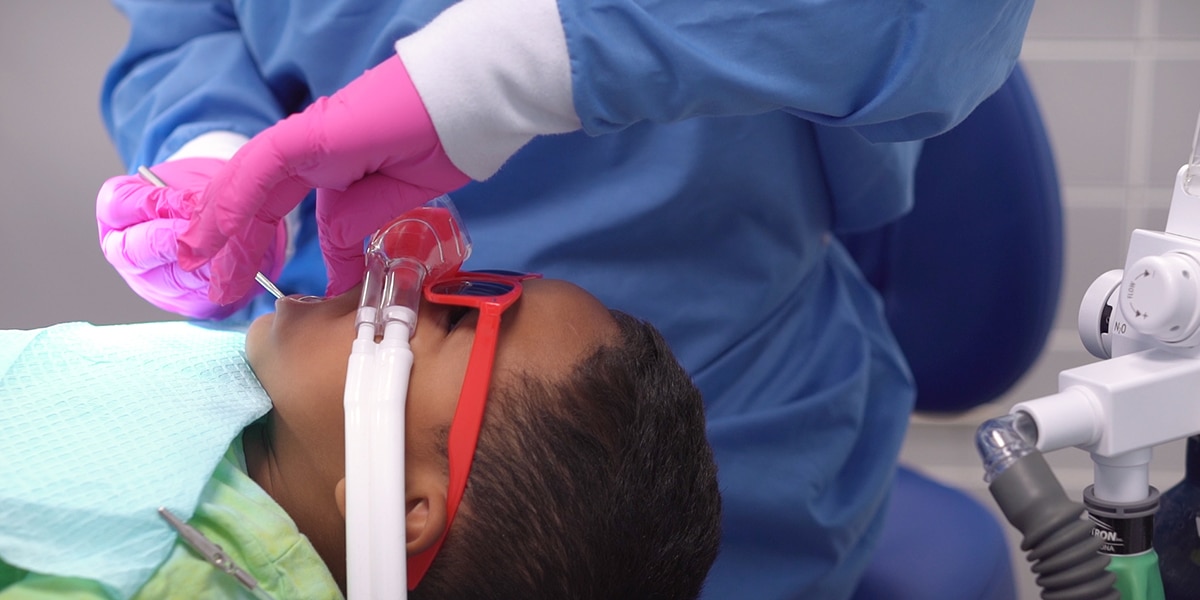Sedation Dentistry for Children in Attleboro

Attleboro Pediatric Dentistry provides sedation dentistry in Attleboro, Massachusetts. Call 508-409-6160 or contact us today to learn more and schedule an appointment.
What Is Sedation Dentistry?
Sedation dentistry is the use of medically induced relaxation techniques during dental procedures. There are a variety of types and levels of sedation available. The type of sedation used will depend on the invasiveness of the procedure, the needs of the patient, and the preference of the parents.
Benefits of Sedation Dentistry
Sedation dentistry offers many benefits, including:
- Relieves dental anxiety. Children who are anxious or fearful of receiving dental care can feel more calm and relaxed with the help of sedation dentistry.
- Makes invasive procedures more tolerable. For particularly invasive dental procedures, sedation can provide a deep enough level of sedation that the patient is unaware of what is going on around them.
- Reduces the amount of local anesthesia needed. While under sedation, patients may not need as much local anesthesia and won’t be as numb in the face afterwards.
- Procedures seem shorter. Sedation helps the time seem to pass quickly so that longer procedures seem shorter.
- Helps children with special needs. Children with special needs who may have difficulty sitting in the dental chair long enough for certain procedures or who have physical or emotional impairments that make dental care challenging can get the care they need with the help of sedation.
Sedation Options We Offer
We provide the following sedation options for children:
- Nitrous oxide. Nitrous oxide, otherwise known as laughing gas, is inhaled through a mask worn over the nose. This is one of the most widely used forms of sedation for children because it takes effect quickly and wears off quickly. It provides a calm, relaxing feeling, sometimes with a tingling sensation in the fingers and toes and heaviness in the arms and legs.
- IV Sedation. IV sedation is administered intravenously and makes the patient feel as if they are asleep. They are unaware of their surroundings for the most part, but can still respond to questions and requests.
- General anesthesia. For specific procedures and situations, general anesthesia may be in the patient’s best interest. It renders the patient completely unconscious and is most often administered in a hospital setting.
Is Your Child a Good Candidate for Sedation Dentistry?
For children who are anxious or fearful when it comes to dental care, sedation may be a helpful tool. Nitrous oxide can help children relax for fillings, root canals, and other procedures. IV sedation may be necessary for oral surgeries and impacted tooth extractions. Children with special needs can often benefit from sedation to reduce the stress of dental procedures.
Why Choose Attleboro Pediatric Dentistry?
We understand the importance of having patience and compassion when it comes to working with children. It is normal for children to be nervous about receiving dental care, which is why we offer sedation to reduce stress and prevent children’s fears from turning into lifelong dental anxiety. We believe that early experiences at the dentist should be positive to help children establish a healthy view of dental care.
Frequently Asked Questions About Sedation Dentistry
Can children return to school or regular activities after sedation?
In the case of nitrous oxide, children can return to school and resume normal activities because the effects wear off quickly. IV sedation requires the patient to rest at home for the remainder of the day. General anesthesia may require an overnight stay in the hospital or rest at home on the day of the procedure as well as the next day.
Is nitrous oxide safe for children?
Nitrous oxide is one of the safest forms of sedation for dental procedures. There are very few side effects and most children feel normal again a few minutes after breathing regular room air.
Is local anesthesia still needed with nitrous oxide?
It depends on the procedure, but most patients will still need local anesthesia in addition to nitrous oxide. But the benefit is that they won’t be as aware that local anesthesia is being administered.
Why does general anesthesia have to be administered in the hospital?
General anesthesia provides a deeper level of sedation that requires specialized equipment. Monitoring by medical professionals in the hospital is the safest option, especially if the patient will be observed overnight.
Can my child eat anything before undergoing sedation?
It is recommended that the patient avoid eating for at least 6 hours prior to IV sedation and 12 hours prior to general anesthesia. There are no eating restrictions before nitrous oxide.
Contact Us
To learn more, call 508-409-6160 or contact us today to schedule an appointment.

